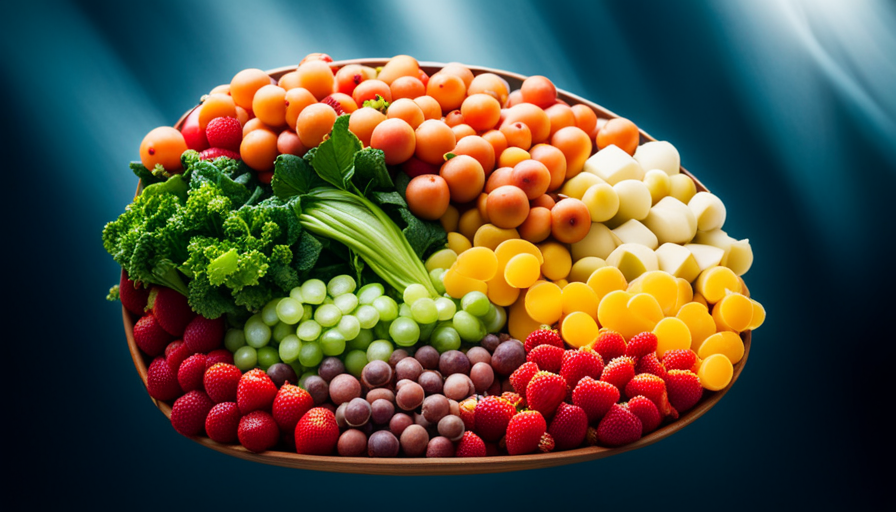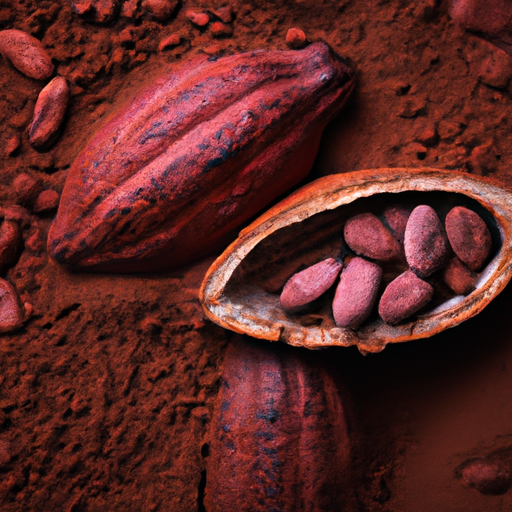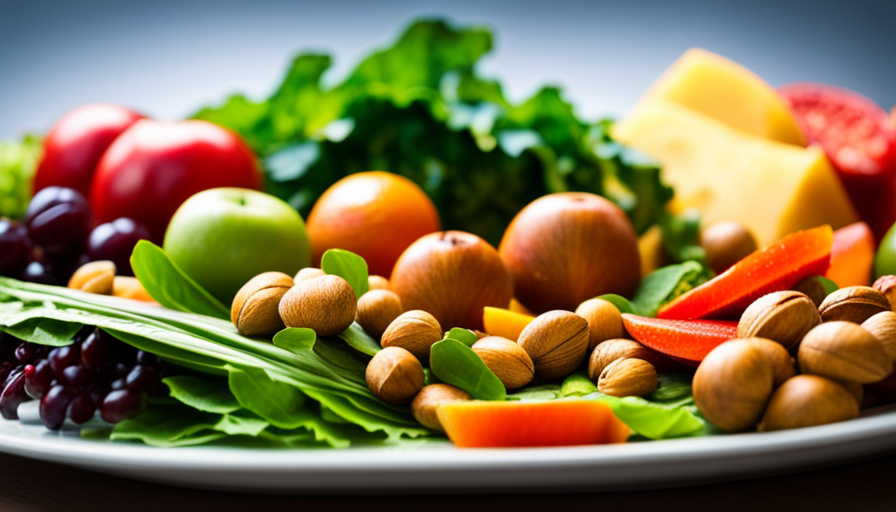Starting a vegan or raw food diet is like stepping into a realm of transformation and rejuvenation. It’s more than just changing what you eat; it’s a deliberate choice to adopt a lifestyle that nurtures your physical, mental, and spiritual health.
By adopting a vegan or raw food diet, one can unlock a plethora of benefits that can truly transform their lives. This culinary shift offers an opportunity to improve physical health, as studies have shown that plant-based diets can reduce the risk of chronic diseases such as heart disease, diabetes, and certain types of cancer. Moreover, this lifestyle change can enhance mental clarity and focus, promote increased energy levels, and improve digestive health.
But the impact of a vegan or raw food diet extends beyond the individual, as it also has significant environmental benefits. By reducing the consumption of animal products, we can contribute to the preservation of our planet’s resources and mitigate the effects of climate change.
In addition to the physical and environmental advantages, this dietary shift can also lead to weight loss and maintenance, vibrant and youthful skin, and even spiritual and emotional growth.
Join me on this transformative journey as we explore the numerous benefits and discover valuable tips for a successful transition to a vegan or raw food diet. Let’s unlock the potential within ourselves and experience a truly transformative change.
Key Takeaways
- Promotes physical, mental, and spiritual well-being
- Reduces the risk of chronic diseases such as heart disease, diabetes, and certain types of cancer
- Enhances cognitive function, memory, attention, and problem-solving skills
- Supports weight loss and maintenance by reducing calorie intake and increasing satiety
Improved Physical Health
Switching to a vegan or raw food diet can work wonders on your physical health, making you feel more energized and vibrant than ever before. One of the key benefits of this dietary lifestyle is improved immune function. A vegan or raw food diet is rich in nutrients, vitamins, and antioxidants, which can strengthen your immune system and help fight off illnesses more effectively.
By consuming a variety of fruits, vegetables, legumes, and whole grains, you provide your body with the essential nutrients it needs to function optimally, thus reducing the risk of chronic diseases. Studies have shown that individuals following a vegan or raw food diet have a lower risk of developing conditions such as heart disease, high blood pressure, type 2 diabetes, and certain types of cancers.
The high intake of fiber, vitamins, and minerals in these diets can help regulate blood sugar levels, lower cholesterol levels, and maintain a healthy weight. Furthermore, the absence of harmful saturated fats and cholesterol found in animal products can contribute to improved cardiovascular health.
A vegan or raw food diet can greatly improve your physical health by boosting your immune function and reducing the risk of chronic diseases. In the next section, we will explore how this dietary lifestyle can also enhance mental clarity and focus.
Mental Clarity and Focus
Enhance your mental clarity and focus by embracing a plant-based lifestyle, as you’ll find your thoughts aligning effortlessly and your concentration sharpening like never before. A vegan or raw food diet has been shown to have a positive impact on cognitive function, leading to improved mental performance. Research suggests that the nutrients found in plant-based foods, such as antioxidants and omega-3 fatty acids, play a crucial role in brain health.
Studies have found that individuals following a vegan or raw food diet experience enhanced cognitive abilities, including improved memory, attention, and problem-solving skills. These improvements can be attributed to the abundance of vitamins, minerals, and phytochemicals present in plant-based foods.
Additionally, consuming a diet rich in fruits, vegetables, nuts, and seeds provides essential nutrients that support brain health, such as vitamin E, folate, and magnesium.
As a result of improved cognitive function, individuals following a plant-based lifestyle often experience increased productivity. With a clear mind and heightened focus, tasks are completed more efficiently, and creativity flourishes. By fueling your brain with nutrient-dense plant-based foods, you’ll find yourself able to tackle challenges with ease and accomplish more in your day-to-day life.
Transitioning from mental clarity and focus, the next section will explore how a vegan or raw food diet can lead to increased energy levels.
Increased Energy Levels
By adopting a plant-based lifestyle, you’ll find yourself bursting with newfound energy and vitality. The increased energy levels that come with a vegan or raw food diet can have a significant impact on your overall productivity.
With a well-balanced plant-based diet, you’ll experience sustained energy throughout the day, allowing you to accomplish more tasks and stay focused on your work. This boost in energy can also lead to increased mental clarity and improved cognitive function.
Moreover, a plant-based diet can contribute to better sleep quality. Research has shown that consuming more fruits, vegetables, and whole grains can help regulate sleep patterns and improve sleep duration. This is because these foods contain nutrients like magnesium, potassium, and tryptophan, which promote relaxation and help regulate sleep-wake cycles.
In addition to increased productivity and better sleep quality, a plant-based lifestyle can also enhance digestive health. The high fiber content in plant-based foods can improve digestion, prevent constipation, and promote a healthy gut microbiome. This, in turn, can lead to better nutrient absorption and overall digestive well-being.
By adopting a vegan or raw food diet, you can experience increased energy levels and better sleep quality, ultimately leading to improved productivity and enhanced digestive health.
Enhanced Digestive Health
Improve your digestive health and say goodbye to uncomfortable bloating and indigestion by incorporating more plant-based meals into your daily routine. Picture waking up in the morning feeling light and ready to take on the day, without the need for antacids or digestive aids.
A vegan or raw food diet can have a transformative effect on your digestive system, primarily by promoting a healthy gut microbiome and enhancing nutrient absorption. The gut microbiome refers to the community of microorganisms that reside in our digestive tract. These microorganisms play a crucial role in maintaining a healthy digestive system. Research has shown that a plant-based diet can promote the growth of beneficial bacteria in the gut, leading to improved overall digestive health.
Additionally, the fiber-rich nature of plant-based foods helps to regulate bowel movements and prevent constipation.
Furthermore, a vegan or raw food diet is often naturally low in processed and refined foods, which can be difficult for the digestive system to break down. By eliminating these foods and focusing on whole, plant-based options, the digestive system is able to function more efficiently.
In addition to promoting digestive health, a vegan or raw food diet can also enhance nutrient absorption. Plant-based foods are rich in vitamins, minerals, and antioxidants, which are essential for overall health. By incorporating more of these nutrient-dense foods into your diet, your body can better absorb and utilize these vital nutrients.
Transitioning to a vegan or raw food diet not only benefits your digestive health and nutrient absorption but also has significant environmental benefits.
Environmental Benefits
Make a positive impact on the environment by adopting a plant-based lifestyle and reducing your carbon footprint. By going vegan or adopting a raw food diet, you not only benefit your health but also contribute to significant environmental benefits. Here are some ways in which a plant-based diet can help create a more sustainable planet:
-
Lower carbon footprint: Animal agriculture is a major contributor to greenhouse gas emissions, deforestation, and water pollution. By eliminating animal products from your diet, you can significantly reduce your carbon footprint and help combat climate change.
-
Conservation of natural resources: Raising animals for food requires vast amounts of land, water, and energy. By choosing plant-based foods, you can help conserve these precious resources. Producing plant-based foods requires less land, water, and energy compared to raising animals.
-
Reduction of deforestation: Animal agriculture is one of the leading causes of deforestation, especially in regions like the Amazon rainforest. By choosing a vegan or raw food diet, you can help reduce the demand for land used for animal farming, thereby preserving forests and their biodiversity.
-
Water conservation: Animal agriculture is a water-intensive industry, requiring enormous amounts of water for raising animals and growing feed crops. By adopting a plant-based lifestyle, you can help conserve water and alleviate water scarcity issues.
By making these environmentally conscious dietary choices, you can play a significant role in reducing your carbon footprint and conserving natural resources. This leads us to the next section, where we will explore the ethical considerations of a plant-based lifestyle.
Ethical Considerations
Consider the ethical implications of adopting a plant-based lifestyle and how it aligns with your values and beliefs. When it comes to ethical considerations, one cannot overlook the impact of a vegan or raw food diet on animal welfare. By eliminating animal products from our plates, we are actively choosing to reduce the harm inflicted on animals in the food industry.
To better understand the extent of this harm, let’s take a look at a comparison table:
| Conventional Diet | Vegan/Raw Food Diet |
|---|---|
| Animals raised in confined spaces | No animal exploitation |
| High demand for animal products | Reduced demand for animal products |
| Animal suffering and cruelty | Ethical treatment of animals |
Adopting a plant-based lifestyle not only promotes ethical considerations but also encourages the ethical treatment of animals. By refusing to support industries that exploit animals, we send a strong message for change.
Moving forward into the next section about weight loss and maintenance, it is important to recognize how a vegan or raw food diet can have positive effects on our well-being.
Weight Loss and Maintenance
When it comes to a vegan or raw food diet, weight loss and maintenance are often seen as significant benefits. Many people choose these diets as a way to shed excess pounds and achieve their desired weight. The emphasis on whole, plant-based foods can lead to a reduced calorie intake and increased satiety, making it easier to control portion sizes and prevent overeating.
One of the reasons why a vegan or raw food diet can be effective for weight loss and maintenance is its focus on nutrient-dense foods. Fruits, vegetables, whole grains, and legumes are rich in fiber, vitamins, and minerals, which can support a healthy metabolism and help maintain a steady weight. Additionally, these diets often exclude processed foods and added sugars, which are known to contribute to weight gain.
To further support weight maintenance, it’s essential to ensure long-term sustainability of the chosen diet. This means finding a balance of foods that provides all the necessary nutrients while also being enjoyable and satisfying. Planning meals, experimenting with new recipes, and seeking support from a registered dietitian or nutritionist can help ensure that the diet remains sustainable in the long run.
Incorporating regular physical activity is also crucial for maintaining a healthy weight on a vegan or raw food diet. Exercise can help increase calorie expenditure, build lean muscle mass, and improve overall fitness levels.
Transition: Now that we’ve explored the benefits of weight loss and maintenance on a vegan or raw food diet, let’s delve into another aspect of these diets: vibrant and youthful skin.
Vibrant and Youthful Skin
Achieving vibrant and youthful skin is a dream for many, and a vegan or raw food lifestyle can help make that dream a reality. These diets are packed with nutrients that provide anti-aging benefits and promote a natural glow.
One of the key factors in maintaining youthful skin is a diet rich in antioxidants, which help protect against free radicals that can damage skin cells and lead to premature aging. Fruits and vegetables, which are staples in both vegan and raw food diets, are excellent sources of antioxidants. They’re also high in vitamins A, C, and E, which play a vital role in maintaining healthy skin.
Additionally, these diets often eliminate processed foods, which can contribute to inflammation and skin problems. By focusing on whole, plant-based foods, individuals following a vegan or raw food diet can nourish their skin from the inside out. So, not only can these diets help with weight loss and maintenance, but they also offer numerous benefits for the skin.
Transitioning into the next section, let’s explore how a vegan or raw food diet can contribute to spiritual and emotional growth.
Spiritual and Emotional Growth
Embrace the potential for spiritual and emotional growth by nourishing your inner self through a plant-based lifestyle. A vegan or raw food diet can be a catalyst for a profound spiritual awakening and emotional healing.
When we consume plant-based foods, we align ourselves with the natural world and its abundance, allowing us to tap into a deeper sense of connection and purpose.
One of the key ways a plant-based diet facilitates spiritual growth is through increased awareness and mindfulness. By consciously choosing to eat foods that come from the earth, we become more attuned to the interconnectedness of all living beings. This heightened awareness can lead to a greater appreciation for the beauty and wonder of life, fostering a sense of gratitude and joy.
Moreover, a vegan or raw food diet encourages emotional healing by eliminating harmful substances that can negatively impact our mood and well-being. Processed foods, laden with artificial additives and preservatives, can disrupt our hormonal balance and leave us feeling sluggish and depleted. By nourishing our bodies with whole, plant-based foods, we provide ourselves with vital nutrients that support emotional stability and vitality.
A vegan or raw food diet has the power to transform not only our physical health but also our spiritual and emotional well-being. By embracing this lifestyle, we can cultivate a deep spiritual awakening and experience emotional healing.
Transitioning to a plant-based diet may seem overwhelming, but with the right guidance and support, it can be a rewarding journey towards a more vibrant and fulfilling life.
Tips for a Successful Transition
When transitioning to a vegan or raw food diet, there are a few key tips that can help ensure a successful transition.
Firstly, it’s important to make gradual dietary changes instead of trying to switch everything all at once. This allows your body to adjust and helps prevent feelings of deprivation.
Secondly, meal planning and recipe resources can be extremely helpful in ensuring you have a variety of delicious and nutritious meals to choose from.
Finally, finding support and community can make a big difference in your transition. Joining online forums or local vegan groups can provide motivation, advice, and a sense of belonging on your journey.
Gradual dietary changes
By incorporating more plant-based foods into my meals, I gradually started to experience the transformative effects of a vegan or raw food diet. Making a gradual transition allowed me to ease into the changes and increase long-term sustainability.
Gradually cutting out animal products and adding more fruits, vegetables, nuts, and seeds not only improved my health but also increased my energy levels, improved my digestion, and helped me maintain a healthy weight. I noticed that my skin became clearer and more radiant, and I felt a greater sense of overall well-being.
It’s incredible how small changes can have such a big impact on our health and vitality. As I continued on this journey, I discovered the importance of meal planning and recipe resources, which I will discuss in the next section.
Meal planning and recipe resources
Discover the joy of planning your meals and exploring a variety of delicious recipes that’ll ignite your taste buds and inspire you to continue on your health journey.
Meal planning is an essential part of maintaining a vegan or raw food diet. It allows you to stay organized, save time, and ensure you have all the necessary ingredients on hand. Luckily, there’re numerous resources available to help you with vegan meal prep. From cookbooks and online recipe websites to meal planning apps, you can easily find inspiration and guidance.
Additionally, it’s important to include a variety of plant-based protein sources in your meals to ensure you’re getting all the essential nutrients. Incorporating legumes, nuts, seeds, and tofu can help meet your protein needs. With these resources and protein-rich options, you’ll be well-equipped to follow a vegan or raw food diet.
As you continue your journey, finding support and community will be crucial in staying motivated and connected.
Finding support and community
Engage with like-minded individuals who share your passion for healthy living and connect with a supportive community that will uplift and inspire you on your wellness journey. Finding support and community is essential when transitioning to a vegan or raw food diet. Joining support groups and online forums can provide a wealth of resources, advice, and encouragement. These platforms allow you to connect with individuals who have similar goals and experiences, creating a sense of camaraderie and belonging. In these communities, you can ask questions, share your successes and challenges, and learn from others’ experiences. Additionally, support groups often organize meet-ups, cooking classes, and potlucks, providing opportunities to make new friends and learn new recipes. The table below highlights some popular online forums and support groups for individuals interested in a vegan or raw food lifestyle:
| Support Group/Forum | Description | Website |
|---|---|---|
| Vegan Community | An online forum for vegans to connect and share information | www.vegancommunity.com |
| Raw Food Support Group | A support group that focuses on the raw food lifestyle | www.rawfoodsupportgroup.com |
| Plant-Based Forums | Forums dedicated to plant-based diets and lifestyle | www.plantbasedforums.com |
| Vegan Facebook Groups | Various Facebook groups where vegans connect and support each other | www.facebook.com/groups/vegancommunity |
Remember, having a supportive community can make your journey to a vegan or raw food lifestyle more enjoyable and successful.
Frequently Asked Questions
Are there any potential health risks or deficiencies associated with a vegan or raw food diet?
There are potential nutrient deficiencies and health risks associated with a vegan or raw food diet. Since these diets restrict or eliminate certain animal products, it can be challenging to obtain adequate amounts of nutrients like vitamin B12, iron, calcium, and omega-3 fatty acids.
This can lead to an increased risk of anemia, bone health issues, and compromised immune function. It’s important for individuals following these diets to carefully plan their meals and consider supplementation to ensure they meet their nutrient needs.
Can a vegan or raw food diet provide enough protein and essential nutrients for optimal health?
A vegan or raw food diet can indeed provide enough protein and essential nutrients for optimal health. For instance, plant-based protein sources such as tofu, lentils, and quinoa can be just as effective as animal-based proteins.
While nutrient deficiencies can be a concern, a well-planned vegan diet can easily meet all nutritional needs through a variety of fruits, vegetables, whole grains, and fortified foods. It’s important to consult with a registered dietitian to ensure a balanced and adequate intake.
How can a vegan or raw food diet impact my social life and relationships?
A vegan or raw food diet can have an impact on social events and navigating social situations. When adopting these dietary choices, it’s important to consider how they may differ from the norm and prepare accordingly.
Communicating with friends and family about your dietary preferences can help avoid awkward encounters at events or gatherings. Additionally, seeking out vegan or raw food-friendly options at restaurants or hosting social events yourself can ensure you feel included and supported in your choices.
Are there any special considerations or precautions to take when transitioning to a vegan or raw food diet?
Special considerations and precautions should be taken when transitioning to a vegan or raw food diet. It’s not as easy as just swapping out your usual meals for plant-based alternatives. It requires careful planning to ensure you’re getting all the necessary nutrients.
Consulting with a registered dietitian can help you create a well-balanced meal plan. Additionally, gradually transitioning and listening to your body’s needs can prevent any potential health issues.
Remember, knowledge and preparation are key to a successful transition.
What are some common misconceptions or myths about vegan or raw food diets that should be addressed?
There are several common misconceptions about vegan or raw food diets that need to be addressed.
One misconception is that these diets lack essential nutrients. However, with proper planning, a vegan or raw food diet can provide all the necessary nutrients.
Another misconception is that these diets are expensive, but they can actually be affordable if you focus on whole, plant-based foods.
Overall, vegan and raw food diets have numerous benefits, such as improved digestion, increased energy, and reduced risk of chronic diseases.
Can a Vegan or Raw Food Diet Help with Hormone Imbalance?
Adopting a raw food diet hormone imbalance fix may help rebalance hormones. Raw foods, high in nutrients and enzymes, can support overall health and may regulate hormone production. However, individual results may vary, and it’s essential to consult a healthcare professional before making significant dietary changes.
Conclusion
In conclusion, embracing a vegan or raw food diet can have transformative effects on your physical, mental, and emotional well-being.
While some may argue that it’s difficult to sustain such a diet or that it lacks essential nutrients, the evidence-based benefits can’t be ignored.
By incorporating a variety of plant-based foods, seeking guidance from nutrition experts, and being mindful of your body’s needs, you can thrive on a vegan or raw food diet.
So why not give it a try and experience the incredible benefits for yourself?










